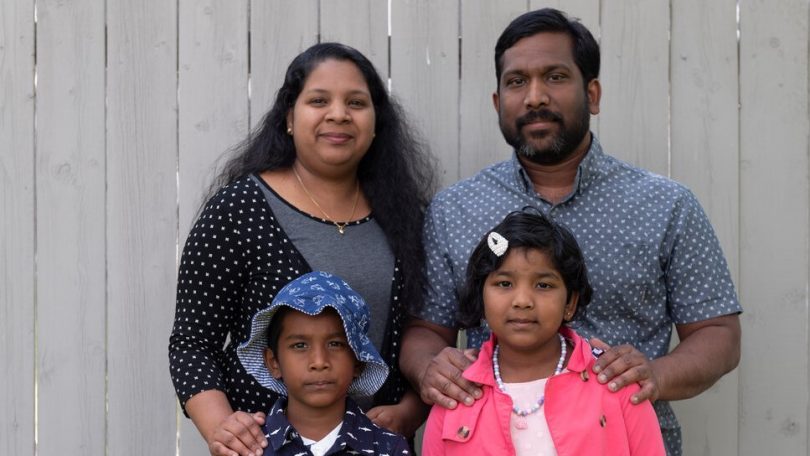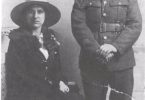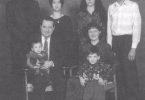This interview was conducted the Canmore Museum on July 24, 2020.
CM: So you must be Bisi. And what’s your name?
Arun: My name is Arun, A R U N.
CM: It’s nice that you’re both here. So I’m just going to say the time is 10:06 AM on the 24th of July, already. I’m here with Bisi and Arun. First, just tell me how you guys are doing,
Arun: Okay right now.
CM: Yeah. Tell me what a regular day looks like for you guys. Do you have kids?
Arun: These days it’s pretty much waking up in the morning, making some breakfast pancakes or something. Bisi will be studying, she’s a student, doing a course at Bow Valley College.
CM: Okay. In what?
Arun: Early childhood education?
CM: Okay.
Arun: That’s her part. The kids will be glad to go outside and play because we live close to a park. If I open the gate, it’s there.
CM: Nice.
Arun: Yeah, we are lucky to be here.
CM: Right now for sure. Are you guys in Banff or in Canmore?
Arun: Canmore. [00:02:00]
CM: Canmore. Okay. So how have your kids been feeling about this whole experience?
Arun: This time of year we always say, “Go play outside, get the fresh air” and things like that. And suddenly we say “don’t.” And we usually say, “Talk to your friends”- are you still there?
CM: Right. And then suddenly you’re saying, don’t talk to anyone. Stay away. Yeah.
Arun: Your picture is frozen, so I don’t know.
CM: Yeah. I’m actually going to turn off my video. Often it makes the audio quality better.
Arun: Okay.
CM: so you guys should leave yours on cause it’s nice to see your smiling faces, but you don’t need to see me. So your kids?
Arun: So now we have to say “Don’t go to other people”, even their friends and talk too much. Stay away from everyone outside our family. They get confused, same with us. Gradually we make them aware of what is going on. And the kids are like eight years old and five years old, so they’re young and it’s not easy. [illegible] what they do, what they eat, you know, that kind of stuff. I feel separate parents feel the same.
CM: Yeah, totally. Your kids were in school, I assume, before all of this, right? Where did they go?
Arun: They were in Elizabeth Rummel school.
CM: Okay
Arun: That’s my daughter.
CM: So you have a son and a daughter.
Arun: A son and a daughter.
CM: So how old are they? You said nine, one of them is nine?
Arun: She will turn nine in September.
CM: Right. Okay. So, um, how long have you guys been in Canada for?
Arun: I came first, I came in 2008.
CM: okay. So you’ve been here for a long time then?
Arun: Yeah, a little bit. And, I got married in 2011, Bisi in 2014 and daughter Alka came to Canada.
CM: So you guys were apart for a few years then?
Arun: Yeah. And Aluv, my son, was born here in Canmore.
CM: Wow. Oh my goodness. That must have been quite the journey to come all the way to Canada. Um, so tell me about what. How things have been going in your house generally, is everyone getting along? Are the kids fighting with each other, or are you guys fighting with each other? What’s that been like?
Arun: With fighting or aggression, I don’t see anything different. We’ll be fighting like usual couples. [laughter]
CM: [laughter] Alas.
Arun: Yeah. It’s all because the same, no conflict apart from their regular conflict.
CM: So you think it hasn’t been very different?
Arun: Not in that way.
CM: Arun what do you do for work?
Arun: I work in the Canmore hospital. As a cook
CM: How long have you been there?
Arun: Three and a half years.
CM: Okay. So for you guys, what’s been the hardest part of everything?
Bisi: The hardest part was the schoolwork, we’ve had to do homeschooling for almost 4 months. It was just hard for them to do everything like watching the email, and there are some things that we’ll do here just really fast. And then they need to stay at home. They can see that friends. We didn’t take anywhere outside of these three months, and the park was still closed.
Arun: So they were stuck within the boundary of the house. And, uh, yeah. And another part she didn’t mention is that apart from the high price in Canmore, there was a time limitation when you can go and [illegible]. At the beginning, like two or three weeks, it was kind of a hassle, but then you get used to it. [00:08:00]
CM: Everyone’s sort of settled into things afterwards for a while, right?
Arun: Yeah. People were buying the tissue paper [laughter].
CM: That was a strange thing. Wasn’t it?
Bisi: I went for sanitizer, and there was no sanitize. Oh my God. I don’t have any sanitizer, what do i do? [laughter]
CM: [laughter] Totally. So Bisi, you’ve been going to school, which has been online now, I assume. How’s that been going?
Bisi: Now that I’ve gotten used to that and started online learning, the two kids are running around, and I have to go to my online classes.
CM: Right. So it’s been a lot more work for you then?
Arun: Yeah, and I must keep working, at the hospital.
CM: Right. So you weren’t home. So Bisi had to kind of manage everything. Wow, no kidding. That sounds really tiring.
Bisi: And he has to keep working at the hospital, three years he’s been cooking for them. And something that makes me scared, is if we go outside-
Arun: I could be like a carrier to all those people in there. Like the patients or any coworkers, so that’s another thing.
CM: So classes have been online. When you attend like a lecture or a class, do you see the professor? Is there a video of your teacher, or is it audio or how does that work?
Bisi: It’s on Microsoft Teams now, which has lots of problems. It’s got video, it’s got audio, but sometimes it’s not working, but it’s all fixed now.
CM: Okay. So I took, um, there were some troubleshooting for a while. So your kids are done in school, right? Do you just kick them out of the house in the morning?
Bisi: [laughter] A good thing is that the park is open now. And when they saw the signs, they were really happy they could play there. They were really happy and running around.
CM: No kidding. Freedom at last. Have you guys bubbled with any other families?
Bisi: Not for the three months.
CM: Yeah. Okay. How about your family back home? Are you guys from India? I didn’t ask.
Bisi: Yeah.
CM: Yeah. How about your family back home? How are they doing?
Arun: We are from the very south state, it’s called Kerala. They were doing pretty good with the coronavirus, there were people who were taking extra measures. But people came from abroad to the state, to the political state, and social-political and social spread or whatever. I’m not sure. It’s becoming more and more, like even if they are [00:12:00] coming home, it’s like very local. Their used to be two or three people-
Bisi: And they’re locked down now.
CM: Oh my goodness. So are your parents back there? I’m just curious how it’s different from Canada in terms of lockdown and what’s been happening and stuff like that.
Arun: It’s a very serious thing there because the population is very high compared to Canada. Even though they’re way higher in education, the population is always where we live, the government, even the public, they’re taking it very seriously. If the government says no to something, most of them will follow the measures. [00:13:00]
CM: So it sounds like it’s not over yet. That’s for sure.
Arun: Oh no, no, no numbers are getting increased greatly.
CM: Are you scared for your family back home?
Arun: We are.
CM: Yeah, I bet.
Bisi: We don’t know when we can go meet them.
Arun: Because we haven’t seen them for the last two years.
CM: Wow. Wow. That’s a long time to be apart from people you love. It’s a really long time. Are you scared that they’re going to get sick, I guess?
Bisi: Yeah. And they’re already sick, they’re having other issues.
CM: Right, right. So that’s extra stressful.
Arun: Yeah. It’s just a trigger, if something bad happens.
CM: So- Oh, I’ve [00:14:00] lost my question. Here we go. Is there anything that’s turned out to be kind of a nice surprise out of this experience? You can say no, because it doesn’t have to have been anything good, but some people I’ve talked to have said there’ve been things that they’ve actually liked about it. Have you found anything like that?
Arun: Oh, I’m supposed to say we have more time, more family time-
CM: Yeah. But that’s not always nice. [laughter]
Arun: Yeah. [laughter] We stick together most of the time. But when there’s not much fun, like going outside or doing something together, that makes it [illegible]. And we’re frontline workers, so I have to be at work.
Amy: Well, especially for you guys, if you’re both working or going to school, more family time means more management. Mostly. [00:15:00]
Arun: Exactly. Yeah. That’s what it does.
CM: Yeah. Yeah, totally. I don’t have any kids, and I can’t imagine having school aged children and having to figure out what to do with them all the time. Yt sounds like school’s probably going to reopen in the fall, what are you going to do if that’s not possible?
Bisi: Yeah, I’m not working,
CM: Right. So try and keep doing your school and get the kids to do their school.
Arun: My plan was to start working in september,
CM: Right.
Arun: My course ends in september, when I will get my certificate. [illegible]
Arun: We may be looking for a second job, at the end of this month.
CM: Oh, okay. So you’ll be really busy then.
Arun: Yeah. I think there’s more layoffs coming to the staff.
Amy: Right. Are you scared you’re going to lose your job, do you think that’s likely?
Arun: I wouldn’t say I’m scared of losing my job, but I just have to sit down and watch. That’s why it’s time to start looking for another job. The job with AHS, I have to see.
CM: Right. So that sounds like it’s been a bit of a, um, concern for you guys is not being able to support yourselves.
Arun: Yeah, that’s a huge concern. Canmore is crazy expensive. Yeah. Knock on
Bisi: Another thing too is that our parents are also depending on us, we need to send money to them too.
CM: That’s common with [00:17:00] lots of families from India, isn’t it, where you also take care of your parents?
Arun: Yeah, it’s not an agreement or a written law thing, but we’ve been doing that for centuries or whatever.
CM: Right. So they’re going to rely on you as well.
Arun: Yeah.
Amy: In terms of your finances. I know this is a personal question, so feel free to not answer it, but, has this been a problem financially in terms of your investments? Tell me about whether or not you’ve struggled to make ends meet or what that’s been like for you guys.
Arun: It’s very devastating. It’s very crucial. I work in a hospital, but I’m not full time there, so I don’t make a lot of money. [00:18:00] Even though the benefits are there, this is not working. So I need to have the job with some benefits for the whole family. But I have to be there. I don’t make much money, the most I make is $2000 per month. And we struggle a lot actually, most of the months we couldn’t even go outside, even one time. Yeah. And we rely on the child support we get for the kids. Insteading of investing it for them, we are sorry to say that we are using that for groceries. So that’s the situation.
Amy: Yeah. Wow. So it sounds like this has been really hard on you guys. That must be tough.So Bisi, have you been taking the CERB benefit, or you can’t cause you’re a student?
Bisi: I got one time, not CERB, the one for students.
Arun: Oh, for students. Okay. So you guys were probably depending on Bisi starting work in the fall to bring in some extra money, right?
Bisi: Yeah.
CM: Yeah. So. That sounds like that will definitely put some strain on you guys. That’s really stressful you two. I’m sorry to hear it.
Arun: Thank you.
CM: You’re welcome, it’s hard. Canmore’s not a comfortable place to live if you don’t have enough money to make ends meet here. How did you guys end up here? Just out of curiosity.
Arun: [00:20:00] Actually in 2008, I came to work in the Rimrock Hotel which is located in Banff. So we’ve been living there, I mean, I’ve been living there around nine and a half years. Then with my family we’ve been between Banff and Canmore for how long?
Bisi: Three or four years?
Arun: Yeah, close to four years and we couldn’t afford the rent there actually. So we tried to get somewhere much cheaper, and I work in Canmore. So I thought, okay, we’ll come here.
CM: Right. Do you guys think that, obviously your community is here now, right? Your kids go to school here and you have friends here and stuff. Do you think you’ll be forced to move as a result of this? Are you going to try and stay in Canmore, whatever happens?
Bisi: As long as we’ve got this house from the Bow Valley Regional Housing. We’ve been here for 5 months now.
CM: So you feel like this is home for good?
Arun: There are some eligibility criteria though. So once you’re approved to be eligible for every year, you can stay here. You probably know, or maybe not, as long as we are in a criteria, we can stay. If not, we have to move out. Moving out means I don’t even make rent.
CM: Yeah. Oh, absolutely. So what are the criteria for you to stay?
Arun: So the gross income amount for the family cannot exceed a year , $69,070 or something.
CM: So it sounds like you guys won’t have trouble staying within the limit right now.
Arun: Yeah. But the kids are growing and once they want to get better education, that time is going to be really hard.
CM: Yeah. It sounds like this is going to have an impact on your lives for a long time. It’s bad timing for you Bisi, because you’ve just finished your course, and you were expecting to work and now you can’t?
Arun: I mean, she’s still [illegible]
Bisi: I decided to continue with the diploma course so I can study for one more year.
Amy: Right. Okay. Are you, um, do you have a scholarship to do that?
Bisi: Yes.
CM: Yes, you do?
Arun: Not the scholarship. I mean [illegible]. Grant.
CM: Or grant. Yeah. Okay. So moving forward it sounds like you guys are [00:24:00] just going to try and make ends meet for a while and not going to make future plans.
Arun: No, no. we’re planning for the day to day. So there are no future plans, sadly.
CM: Yeah. How do you feel about that? Do you think the pandemic has taken that away from you?
Arun: The pandemic is, what do you call it? Making it worse.
CM: Yeah, right. Are you mad? How do you feel about that? I know that it’s not anybody’s fault, but-
Arun: No, I’m not mad. We are adults right, so we know the situation.
CM: Yeah.
Arun: Yeah. The worst we could say is that it’s our fate. We take it that way..
CM: Yeah. But frustrating. Yeah. [00:25:00] Yeah. Totally. What is the part of this experience that you think you’ll remember the most? When your kids are older or they have grandkids, what are you going to tell your grandkids about?
Arun: I don’t want to say something negative to them, but I would definitely say that people panicked over disposable tissue.
CM: Yeah. That’s what you’re going to remember. Fair enough.
Arun: Cause I don’t want to say or talk about all the dead bodies or something. I don’t think I would tell them that, I’m not sure. Not in this moment would I say that. Maybe, maybe not, but definitely [illegible]
CM: It was a strange thing. Wasn’t it? That experience.
Arun: Yeah.
CM: So do you guys talk to your parents back home a lot? Like, do you call them often?
Arun: Every day.
CM: Oh yeah. Well, so you’re still pretty connected to them then. Yeah. Yeah. That must be a hard part for you not knowing when you’ll be able to travel. Although it’s expensive to travel for sure.
Arun: Yeah.
CM: You’re not making any plans right now.
Arun: No, no, no. I can’t do anything about it.
Amy: No, no. We have the pause button right now. Yeah.
Arun: Her mom was asking, “When do you guys plan to go?” She’s really ill, and wants to come to see the [00:01:00] kids. So even though she knows the situation and what’s going on around the world, she wants to see us. So she’s forcing us like, “Come on, come on.” But it doesn’t work like that.
CM: So you’re, there’s a lot of pressure from your family to come visit, even though it’s not possible right now.
Arun: Yeah. Yeah.
CM: Well, even if you had the funds, it’s not very easy to get out of the country.
Arun: No, no, no. Even if you go back, it used to be 14 days and now it’s 28 days in quarantine. For going back that long, what’s the point, if you’re just going to be stuck inside the room.
CM: Yeah. Well, especially if you want to spend time with your family. So there’s no point in going for two [00:02:00] weeks to stay alone in a room. Oh, there’s a little one! Hi dude. Oh, he’s very cute you two. Hey kiddo.
Arun: Do you want to say hello to Amy?
Child: Good.
CM: Good. What are you doing today? It’s raining, hey?
Arun: Raining and cold.
CM: You got any other plans?
Child: No.
CM: Are you missing school? Or are you glad it’s done?
Child: I’m glad it’s done.
CM: [laughter] How do you think your parents feel about that? You don’t know? That’s funny. What’s your favorite part about summertime?
Child: I get to play outside.
CM: Playing outside is pretty fun. Have you seen any good bugs lately?
Arun: There was some trouble hearing.
CM: Oh, I said, have you seen any good bugs lately?
Child: Yeah.
CM: Yeah. What did you see? I saw a big fat bumblebee the other day.
Child: I saw a dragonfly.
CM: Oh, wow. That’s lucky. I haven’t seen one of those yet this year. What else have I seen? I saw a butterfly the other day. You must see butterflies in the park all the time.
Child: I see so many butterflies.
CM: Well, you’re special. I bet they come to find you. They want to see where you are. They’re coming to visit. What do you, uh, what do you think is going to happen in the fall? Are you going to go back to school? Oh, and there’s number two, hi number two. [laughter] The whole gang’s here. How’s your day going?
Child 2: Pretty good.
CM: How old are you?
Child 2: Eight.
Child: Eight.
CM: Well you can’t both be eight. [laughter] Well, maybe you can. I don’t know. But when you looked a lot smaller than the other one, yeah, I think you’re right. Thank you for telling me the truth, one of you, I appreciate that. [laughter] What else are you going to do today?
Child: I don’t know.
CM: That’s summertime. You don’t have to do [00:05:00] anything. Try and leave your parents alone. That’s what, uh, that’s what summertime is for.
Arun: [laughter]
CM: Yeah, both you guys are at home now. When I was growing up, my parents were gone. I had the whole house to myself. I know, can you imagine? But there’s nobody to cook lunch. You have to take care of your own lunch. So that’s less good.
Arun: He knows how to make peanut butter- No, I mean the nutella and bread. That’s his favorite.
CM: Well, it’s a very traditional Indian food from what I’ve heard.
Arun: [laughter]
CM: Okay. Well, I don’t have a lot more questions for you guys. Kiddos, is there anything you want to tell me? It’s kinda hard to explain what I’m doing. I’m from the museum. Do you know what that means?
Child: Yeah.
CM: Yeah. So I’m talking to your family about what your experience during the virus has been like, do you know what the virus is? Do you understand?
Child: Covid-19.
CM: Yeah. Can you tell me what you think is going on?
Child: The virus is spreading.
CM: Are you scared about getting sick? What do you think’s going to happen?
Child: It’s going to get stopped?
Amy: [laughter] You don’t know what’s going to happen. No me neither. Well, it will be interesting to see anyway, but it sounds like it’s a stressful time for everybody in your house, except for the young kids. You just get to watch TV and go outside. Could be worse. Well, is there anything else you guys think I should know? I don’t have any more questions, I don’t think. Mom and dad?
Arun: Oh, I thought you were still talking to the kids.
CM: Tell me, everybody. I can only see one fourth of Bisi’s face, but I know you’re there. Oh, there you go. Everybody fits in. Yeah. Is there anything else you want me to know? What are you expecting to happen in the future? Do you have any ideas of what’s going to happen?
Arun: No [laughter].
Amy: No, me neither, but some people think they understand. Are you confident schools are going to reopen in the fall? Do you think that’s likely?
Arun: Both yes and no. I’m glad that they’re going [00:08:00] back to school, but at the same time, we worry about the safety precautions, and how it’s going to be implemented. Even though there’s safety machines and everything there, I keep worrying about if the kids are going to follow rules or not, and how they’re going to manage. that many kids. So that’s my biggest concern.
Amy: Little kids don’t understand really, that you’re not supposed to touch people. And I know when I was a kid, I was sticking my fingers in my nose about every five minutes. Your kids are very cute, especially the little boy, he’s got a cute face. Um, so I only really have one question. One last question, which is that this is kind of like [00:09:00] making a phone call to the future. Researchers will come to the archives to read your interview, and it might go into museum exhibitions and stuff like that. And people now have a lot of interest in the material that we have on the Spanish flu a hundred years ago. If you wanted to say something directly to those people who are going to come and read about your life during this time, what would you want them to know?
Arun: Confused. Devastated.
CM: Yeah, you’ve used the word devastated a lot. It sounds like it’s been really hard on your family. Things are tight for you guys hey? You said confused, why did you say confused?
Arun: Social distancing, like at the [00:10:00] beginning we didn’t get what that meant exactly? Like how much distance? And we’re from an Eastern background, so our culture is more connected within the society compared to Canada. So that’s what we have in our brains.
CM: More communal?
Arun: Yeah. One morning, no more social interaction or no people’s systems. And that’s kinda confusing. In the beginning days, what’s going on around the world, and too many different news sources. So many people died in these places and I don’t really know what’s happening, [00:11:00] or really what it is. That kind of situation. That’s why we got confused, what to do and how are we gonna make it through all of this.
Amy: And there were a lot of, um, mixed messages in the beginning, too, about what to do and what not to do. Thankfully everything’s totally clear now, right? [laughter] yeah, totally. I really appreciate your time you guys, thanks for taking the time to talk with me. It was really nice to meet you and I hope you can make things work.
You know, it sounds like it’s really tough for you guys right now. And I totally empathize with how stressful that would be.
Arun: Yeah.
CM: Well, one way or the other you got to get through, I guess. [00:12:00] Well take care you guys. And maybe we can catch up again in a couple of months if you have the time to talk about how things are going then.
Arun: Definitely. We’ll look forward to it.
CM: Okay. I will talk to you later, take care everybody. Bye bye. Thank you.
Arun: [with family] Thank you.
The Stories of Resilience project offers deeply personal insights into the lives of Bow Valley residents during the COVID-19 pandemic. They each share their unique challenges, fears, hopes, and lessons learnt during this unique time in history. This project was brought to life by a collaboration of local organizations: Bow Valley Immigration Partnership (BVIP), artsPlace Canmore, Kristy Wolfe Photography, Canmore Museum. With special thanks to Community Connections in the Bow Valley.
Explore More Stories of Resilience







